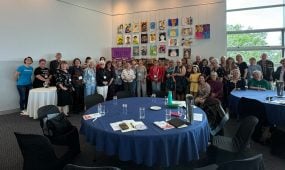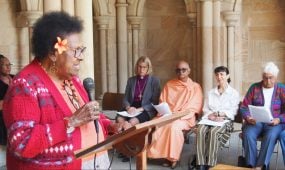“Blessed are the peacemakers, for they will be called children of God”
Reflections
“So as the Russian army continues to invade Ukraine I wonder how the children of London, and the children of each European city, are dreaming? And, I wonder how the children of Ukraine are going in a nightmare that has become real?” asks Bishop Cam Venables

In the late 1970s, when I was growing up in London, the possibility of war between the United States of America and the Soviet Union seemed to be always in the background. Strategists wrote about the “nuclear theatre of Europe” and there was much theorising about which cities would be destroyed in pre-emptive strikes.
In 1980 the British Government issued a booklet to all households titled Protect and Survive, detailing what people could do to prepare in the case of nuclear attack. Astonishingly, it suggested that if we filled bin bags with soil and stacked these on and around a dining table, as we sheltered under it, that we would be protected!
In 1982 author Raymond Briggs wrote a beautifully illustrated children’s book called When the Wind Blows that described the deteriorating health of an old elderly English couple who collect rainwater to drink and slowly die of radiation sickness. This was later animated and turned into a stage play.
The Polaris submarine was a household name. And, the nuclear weapon site at Greenham Common in Berkshire became a major focus of protest because it seemed to many that they increased the risk of annihilation rather than deterring it!
For months I dreamt regularly as a teenager about opening my bedroom curtains at night and looking towards the city. The view would suddenly become searingly white and I’d wake up with my heart racing…sometimes crying, sometimes not.
So as the Russian army continues to invade Ukraine I wonder how the children of London, and the children of each European city, are dreaming? And, I wonder how the children of Ukraine are going in a nightmare that has become real?
Advertisement
As people of faith, we seek comfort, wisdom and inspiration from reading different parts of the Bible and I wonder what passages are resonating with you at this time? I really think it would be good to share this. I’ll share some initial thoughts to prime the pump for our thinking and would love to read or hear yours in response.
The commands of Christ to love neighbour (Mark 12.31) and love one another (John 13.34) each seem like important places to start and these are being well demonstrated by Ukrainians opening their homes to people fleeing internally, and in neighbouring countries offering hospitality to vast numbers of refugees.
But, for Christian people in Ukraine, how can they love their Russian neighbours when those neighbours have breached international law and invaded? How can they love their neighbour when that neighbour has destroyed homes, hospitals and schools, and killed family members, friends and colleagues?
The direction from Christ to ’”love your enemies and pray for those who persecute you” (Matthew 5.44) is easier to do when you’re not at war, as would turning the other cheek (Matthew 5.39). Perhaps careful exegesis and reflection on context would be needed before applying these too quickly.
Advertisement
We know that Jesus wept when his friend Lazarus died (John 11.35), and wept over Jerusalem for rejecting an opportunity (Luke 19.41), so it’s probably reasonable to assume that God weeps over Kyiv, Kharkiv, Mariupol and all Ukrainian cities and towns. Is it also possible to think of God weeping at the decisions made by Russian President Vladimir Putin who could be understood as both prodigal child and demon?
Five hundred years before Christ, Greek orator and general, Pericles, affirmed that, “Freedom is the sure possession of those alone who have the courage to defend it…” And, though the odds against them are great, the courage of the Ukrainian people has been well demonstrated. Do we then ask God in prayer to help them “smite” their enemies? (Joshua 10.19 KJV).
If the story of Cain and Abel teaches us nothing else (Genesis 4.1-16), it teaches us that conflict and murder have consequences, and we might wonder if it’s possible for human beings to live differently.
Inspired by God, Isaiah clearly thought so for he offered a vision of a future time in which, “God shall judge between the nations, and shall decide for many peoples; and they shall beat their swords into ploughshares, and spear into pruning hooks; nation shall not rise against nations; neither shall they learn war anymore” (Isaiah 2.4).
“Blessed are the peacemakers,” Jesus said, “for they will be called children of God.”
Holy God,
We give thanks for blue sky, and yellow sunflowers;
We grieve red blood, and grey rubble;
and, remember a rainbow covenant.
In your mercy, we ask for your blessing,
on the people of Ukraine.
Amen





